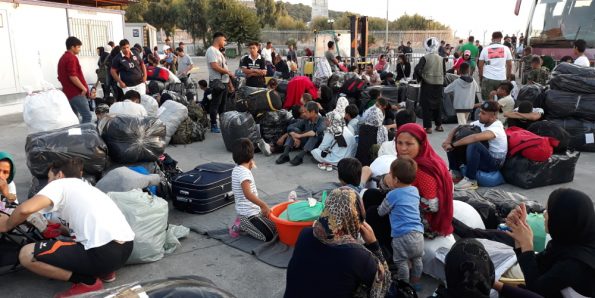
The United Nations High Commissioner for Refugees (UNHCR) said it is "deeply concerned" about the departure of some 9,000 recognised refugees from Greece’s reception system, which began on June 1.
Read the summary of what was said by UNHCR spokesperson Andrej Mahecic, at the press briefing held at the Palais des Nations in Geneva here:
"UNHCR, the UN Refugee Agency, is deeply concerned over government-arranged exit of some 9,000 recognized refugees from Greece’s reception system which began yesterday (1 June). In the coming months another 11,000 refugees will have to transit from assistance for asylum seekers to general social welfare, once recognised as refugees by Greece’s asylum authorities.
A new law adopted in March 2020 reduces the grace period for recognised refugees from six months to 30 days to make a transition from organised accommodation and basic support to an independent living.
The objective to make more resources and space available for asylum-seekers is well-understood, Greece’s reception system is facing a shortage of places. Recognised refugees need to vacate much needed accommodation for asylum seekers waiting in crowded reception facilities on the Greek Aegean islands. Over 31,000 women, men, and children live in five island reception centres with capacity for fewer than 6,000.
However, UNHCR has continuously expressed concerns that assistance for many recognised refugees is ending prematurely, before they have an effective access to employment and social welfare schemes, foreseen by Greek law. Also, UNHCR has been urging Greece to increase the national reception capacity at sites, apartments, hotels and through cash for shelter.
Forcing people to leave their accommodation without a safety net and measures to ensure their self-reliance may push many into poverty and homelessness. Most of the affected refugees do not have regular income, many are families with school-aged children, single parents, survivors of violence, and others with specific needs. The ongoing COVID-19 pandemic and measures to reduce its spread create additional challenges by limiting people’s ability to move and find work or accommodation.
Shifting a problem from the islands to the mainland is not a solution. UNHCR has been urging authorities to apply a phased approach, a higher threshold to extend assistance to vulnerable people who cannot leave at this stage.
Refugee integration is a process which requires sincere efforts from refugees to become self-sufficient and give back to their host society. At the same time effective access to national schemes and integration programmes which offer language classes, vocational training, and access to gainful employment are key.
Refugees are eligible for several national schemes providing minimum guaranteed income, housing support and other benefits to the most vulnerable. In practice, however, refugees face barriers in accessing support. UNHCR has proposed concrete measures to the Greek authorities and is working with the Government to promote their effective inclusion.
Among those scheduled to leave their accommodation now are 4,000 refugees staying in the UNHCR-managed ESTIA accommodation scheme, funded by the European Commission. The programme’s rules and eligibility are determined by the Greek government. UNHCR runs ESTIA across Greece in partnership with municipalities and NGOs, and significant joint efforts have been made to foster inclusion and empower refugees to participate in the social life of their host communities. ESTIA provides safe and dignified housing in apartments to 22,700 vulnerable asylum seekers and refugees.
UNHCR welcomes HELIOS, an integration programme, funded by the European Commission and implemented by the International Organization for Migration, IOM, in coordination with Greek authorities. HELIOS can bridge crucial gaps but flexibility is needed to cover a large number of refugees who are now leaving their accommodation.
We stand ready to continue assisting Greece to find solutions and address this complex situation and ensure that recognised refugees get adequate support in their ongoing transition to self-reliance."
Meanwhile, Migration and Asylum Minister Notis Mitarachi, stated that "in the last three months we have tripled the asylum decisions and we will deliver 40,000 decisions in the next few weeks."
His comments were made during an interview with SKAI TV on Tuesday, adding that the top priority "is a rapid separation of those with a refugee profile from the economic migrants."
Referring to the 92 accommodation facilities on the Greek mainland, he said that the target is to close at least 60 of them by the end of this year.
Mitarachi presented figures according to which 60,000 people had been granted asylum in the last five years, of which 58,500 had found jobs to support themselves and a place to stay. The remaining 1,500 people were still in a transitional rent subsidy programme, the HELIOS programme, to which the 11,000 people due to exit the reception system currently have access.
On the reduction of migrant flows to the Greek islands in the last months, Mitarachi said that "due to the constant presence of the Hellenic Navy and the Coast Guard, the boats setting off from the Turkish coast do not cross the mid-line but finally turn around and go back."

